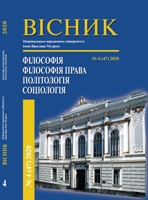СИМВОЛІЧНА ЛОГІКА: ПОВЕРНЕННЯ ДО ВИТОКІВ. СТАТТЯ ІІ. БАЗОВІ КАТЕГОРІЇ
SYMBOLIC LOGIC: RETURN TO THE ORIGINS. PAPER II. BASIC CATEGORIES
Author(s): Yaroslav Olexiyovych KokhanSubject(s): Philosophy, Logic, Analytic Philosophy
Published by: Національний юридичний університет імені Ярослава Мудрого
Keywords: logistics; categories; individual; function; representation; choice functions; sequence;
Summary/Abstract: Problem setting. The paper is the Part II of the large research, dedicated to both revision of the system of basic logical categories and generalization of the modern predicate logic to functional logic. Basic categories of functional logic are the following: an individual, a function, representation, and a sequence. Paper objective. The main task of the paper is to describe every one of the categories in question. The more expansive task of all the paper series is to expose the whole system of functional logic and to prove its advantagies.Recent research and publications analysis. Functional logic was discovered by the author in 1997, and there is no investigation in this field up today except of papers of the autor.Paper main body. An individual is any theoretical object regarded as atomic. Functions are regarded as ambiguous in general case, maybe nullary, and are treated as methods to represent some (any) objects. Most important types of functions are individuals’ functions (for example, arithmetic operations), functionals, and operators. Representation is the ultimate generalization of equality; we treat representation as any specification of an object, as a way to make it present. Fundamentals of the theory of representation are following: any individual can be represented either by itself as a function, or by a nullary function, or via other objects by a function with argument places. The corrected form (with respect to the Paper I) of representation formulas, i. e., atomic formulas of functional logic are involved. The form of terms that represents general names in formal languages of functional logic is present. Both these corrections use the machinery of choice functions, i. e., functions that “elect” one value of any ambiguous function in any case of its use. A sequence treated as a basic nondefinable logical notion. The nondefinability of the notion of a sequence will be proved in another paper. When we operate with individuals, functions, and representation, we structure them in sequences such that every latter has the first element and is discrete (and many of them also have the last element). Conclusions of the research. An individual and a function are relative categories because, first, when we start to talk about a function, it became an individual with the name “such and such a function” and, secondly, when an individual is represented by itself, it became a function. Also, categories of an individual, a function, representation, and a sequence are basic but not universal for logic, i. e., not every logical object is either an individual or a function or representation or a sequence. Say, semantical categories of an expression, a sense, and a denotation are independent of four described above. This means that we described above the field of logic, independent from semantics. The author calls this field (and its theory) logistics.
Journal: Вісник НЮУ імені Ярослава Мудрого. Серія: Філософія, філософія права, політологія, соціологія
- Issue Year: 47/2020
- Issue No: 4
- Page Range: 47-57
- Page Count: 11
- Language: Ukrainian

